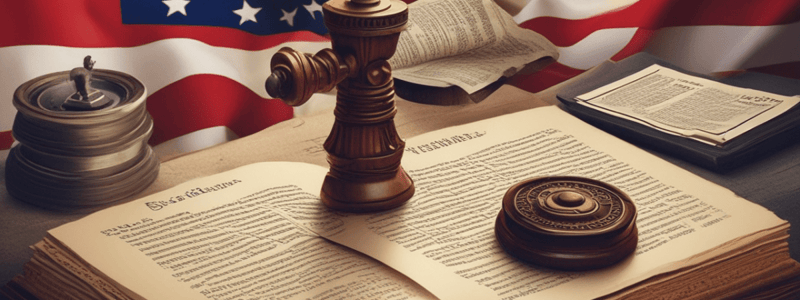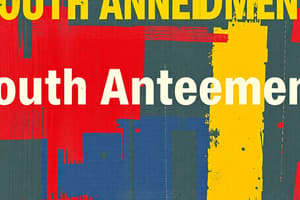Podcast
Questions and Answers
What is the significance of abandoning property in terms of reasonable expectation of privacy?
What is the significance of abandoning property in terms of reasonable expectation of privacy?
What is the primary factor in determining whether an area is considered 'open field'?
What is the primary factor in determining whether an area is considered 'open field'?
What is the term for the grounds and buildings surrounding a house or living space?
What is the term for the grounds and buildings surrounding a house or living space?
What is required for a police officer to enter a public area to search for and seize evidence or contraband?
What is required for a police officer to enter a public area to search for and seize evidence or contraband?
Signup and view all the answers
What is the term for an area which would normally be considered part of a curtilage but is freely accessible to members of the public?
What is the term for an area which would normally be considered part of a curtilage but is freely accessible to members of the public?
Signup and view all the answers
What is the primary consideration when determining if a search of a protected area by a private person is valid?
What is the primary consideration when determining if a search of a protected area by a private person is valid?
Signup and view all the answers
What is the significance of a vehicle left unmoved in a public place for an extended period of time?
What is the significance of a vehicle left unmoved in a public place for an extended period of time?
Signup and view all the answers
What is the term for the amount of privacy considered appropriate by society, as reflected in the law?
What is the term for the amount of privacy considered appropriate by society, as reflected in the law?
Signup and view all the answers
How many factors do courts consider when determining if an area is within the 'curtilage of a dwelling'?
How many factors do courts consider when determining if an area is within the 'curtilage of a dwelling'?
Signup and view all the answers
What is the significance of identifying the justification to search abandoned property?
What is the significance of identifying the justification to search abandoned property?
Signup and view all the answers
What is the primary purpose of the lesson on non-Fourth Amendment seizures?
What is the primary purpose of the lesson on non-Fourth Amendment seizures?
Signup and view all the answers
What is required to establish abandonment of personal property, vehicles, or premises?
What is required to establish abandonment of personal property, vehicles, or premises?
Signup and view all the answers
What is the primary factor in determining whether an area is considered 'curtilage' of a dwelling?
What is the primary factor in determining whether an area is considered 'curtilage' of a dwelling?
Signup and view all the answers
What level of certainty is required for a seizure under the Plain View Doctrine?
What level of certainty is required for a seizure under the Plain View Doctrine?
Signup and view all the answers
When can law enforcement search a public area without a warrant?
When can law enforcement search a public area without a warrant?
Signup and view all the answers
What is the primary consideration in determining whether an individual has lost their reasonable expectation of privacy in a public place?
What is the primary consideration in determining whether an individual has lost their reasonable expectation of privacy in a public place?
Signup and view all the answers
When can surveillance of private property be considered reasonable?
When can surveillance of private property be considered reasonable?
Signup and view all the answers
What is the most appropriate action to take when evidence or contraband is on curtilage, in plain view, but outside the area where the officer has a legal right to be?
What is the most appropriate action to take when evidence or contraband is on curtilage, in plain view, but outside the area where the officer has a legal right to be?
Signup and view all the answers
What is the primary requirement for a defendant to claim Fourth Amendment protection?
What is the primary requirement for a defendant to claim Fourth Amendment protection?
Signup and view all the answers
What is the primary difference between an overnight guest and someone who is merely present with the consent of the householder?
What is the primary difference between an overnight guest and someone who is merely present with the consent of the householder?
Signup and view all the answers
What is the main factor in determining the extent of Fourth Amendment protection in commercial property?
What is the main factor in determining the extent of Fourth Amendment protection in commercial property?
Signup and view all the answers
What is the primary requirement for a valid seizure under the Plain View Doctrine?
What is the primary requirement for a valid seizure under the Plain View Doctrine?
Signup and view all the answers
What is the main difference between a search by a private citizen and a search by a law enforcement officer?
What is the main difference between a search by a private citizen and a search by a law enforcement officer?
Signup and view all the answers
What is the primary limitation on an officer's search based on information obtained by a private citizen?
What is the primary limitation on an officer's search based on information obtained by a private citizen?
Signup and view all the answers
What is the main reason why an officer may use information gathered by a private citizen in a search?
What is the main reason why an officer may use information gathered by a private citizen in a search?
Signup and view all the answers
What is the primary difference between a search by an overnight guest and a search by someone who is merely present with the consent of the householder?
What is the primary difference between a search by an overnight guest and a search by someone who is merely present with the consent of the householder?
Signup and view all the answers
What is the primary requirement for an officer to seize property under the Plain View Doctrine?
What is the primary requirement for an officer to seize property under the Plain View Doctrine?
Signup and view all the answers
What is the primary limitation on the scope of a search by an officer based on information obtained by a private citizen?
What is the primary limitation on the scope of a search by an officer based on information obtained by a private citizen?
Signup and view all the answers
What is the justification needed to search an open field?
What is the justification needed to search an open field?
Signup and view all the answers
What is the justification needed to search a curtilage?
What is the justification needed to search a curtilage?
Signup and view all the answers
Under what circumstances can law enforcement officers board buses to conduct searches?
Under what circumstances can law enforcement officers board buses to conduct searches?
Signup and view all the answers
What is the distinction made in the case of U.S. v. Bond (2000)?
What is the distinction made in the case of U.S. v. Bond (2000)?
Signup and view all the answers
What is the exception to the reasonable expectation of privacy in public rest room stalls?
What is the exception to the reasonable expectation of privacy in public rest room stalls?
Signup and view all the answers
What is the limitation on officers using surveillance in public areas?
What is the limitation on officers using surveillance in public areas?
Signup and view all the answers
What is the significance of the Minnesota v. Carter (1998) case?
What is the significance of the Minnesota v. Carter (1998) case?
Signup and view all the answers
What is the distinction between a public area and a quasi-public area?
What is the distinction between a public area and a quasi-public area?
Signup and view all the answers
What is the significance of the law enforcement officer's actions in the Minnesota v. Carter (1998) case?
What is the significance of the law enforcement officer's actions in the Minnesota v. Carter (1998) case?
Signup and view all the answers
What is the implication of the Minnesota v. Carter (1998) case on the concept of 'standing'?
What is the implication of the Minnesota v. Carter (1998) case on the concept of 'standing'?
Signup and view all the answers
Study Notes
Non-Fourth Amendment Seizures
-
Abandoned Property: No reasonable expectation of privacy exists, as the owner has relinquished dominion and control.
- Must show that it was reasonable to believe the ownership of the property had been relinquished.
- Examples of abandoned property:
- Personal property dropped or thrown away in a public place.
- Items in the trash in a non-curtilage area.
- Owner stating they are not the owner.
- Vehicle left unmoved in a public place for an extended period.
- Vehicle left running at the end of a pursuit.
- Justification: No justification needed to search abandoned property, as it has no owner to challenge the search.
Open Field Doctrine and Curtilage
- Reasonable Expectation of Privacy: The amount of privacy considered appropriate by society, as reflected in the law.
-
Definitions:
- Open Field: Area of public land or private land without legitimate expectation of privacy.
- Curtilage: Grounds and buildings immediately surrounding a house, used for family and home-life activities.
- Public Area: Area with unrestricted access, not part of curtilage.
- Quasi-Public Area: Area normally considered part of curtilage but freely accessible to the public.
-
Four Factors: Courts consider the following when determining if an area is within curtilage:
- Distance from the home to the place in question.
- Whether included in an enclosure.
- Nature of use (domestic activities).
- Steps taken to protect the area from observation.
- Justification: Probable cause needed to search curtilage, while open fields and public areas require no justification.
Plain View Doctrine
-
Three Elements:
- Officer has the legal right to be in the location.
- Officer immediately recognizes the property as evidence of a crime or contraband.
- Officer has legal access to the area to seize it.
- Probable Cause: Officer must have probable cause that the items are contraband or evidence.
- Action: If evidence is on curtilage, in plain view, but outside the area where the officer has the legal right to be, impound the property and seek a search warrant.
Search of Protected Areas by Private Persons
- Private Citizen Restrictions: Citizens are not bound by the Fourth Amendment requirements/restrictions.
- Scope of Search: Officer's search is limited to the same area as the original private search.
- Participation: If law enforcement officers participate in or encourage a private search, it becomes a Fourth Amendment search.
- Use of Information: Officers can use information gathered by a private citizen, as long as no law enforcement officers took part in or encouraged the search.
Studying That Suits You
Use AI to generate personalized quizzes and flashcards to suit your learning preferences.
Description
This lesson explores exceptions to the Fourth Amendment of the US Constitution, focusing on non-Fourth Amendment seizures. Learn about the basics of constitutional law and understand the scope of this fundamental right.




